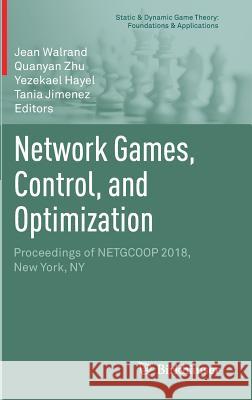Network Games, Control, and Optimization: Proceedings of Netgcoop 2018, New York, NY » książka
topmenu
Network Games, Control, and Optimization: Proceedings of Netgcoop 2018, New York, NY
ISBN-13: 9783030108793 / Angielski / Twarda / 2019 / 287 str.
Kategorie:
Kategorie BISAC:
Wydawca:
Birkhauser
Seria wydawnicza:
Język:
Angielski
ISBN-13:
9783030108793
Rok wydania:
2019
Wydanie:
2019
Ilość stron:
287
Waga:
0.59 kg
Wymiary:
23.39 x 15.6 x 1.75
Oprawa:
Twarda
Wolumenów:
01
Dodatkowe informacje:
Wydanie ilustrowane











